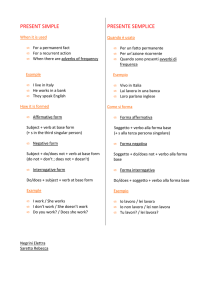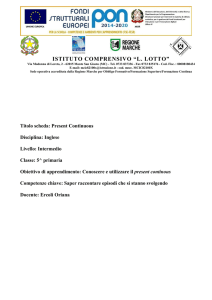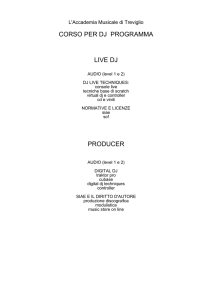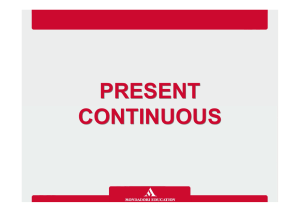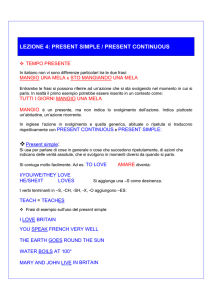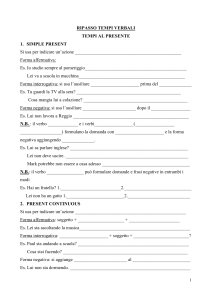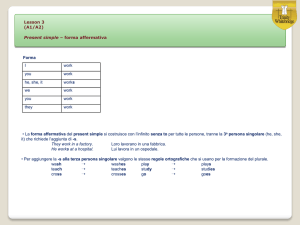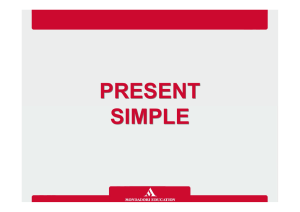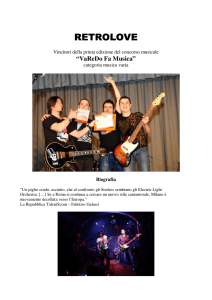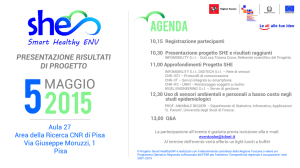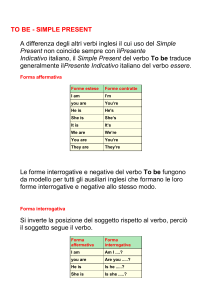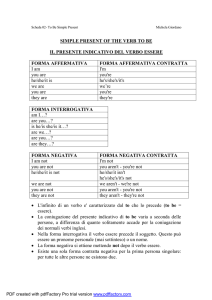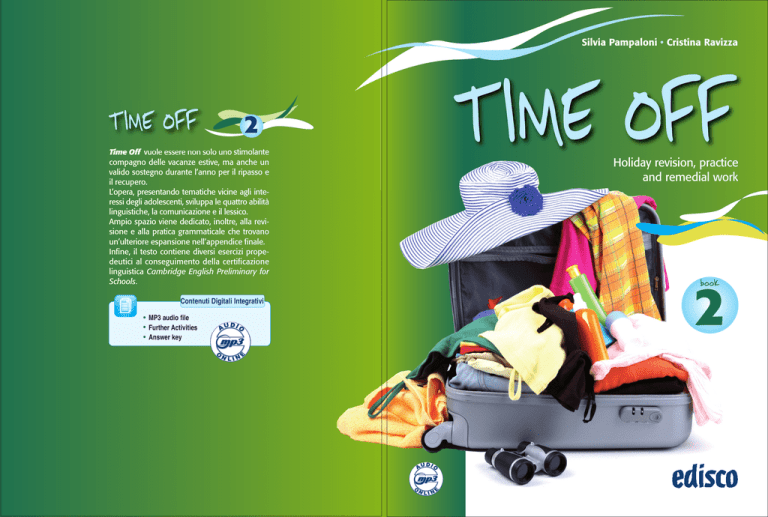
Silvia Pampaloni • Cristina Ravizza
TIME OFF
2
Time Off vuole essere non solo uno stimolante
compagno delle vacanze estive, ma anche un
valido sostegno durante l’anno per il ripasso e
il recupero.
L’opera, presentando tematiche vicine agli interessi degli adolescenti, sviluppa le quattro abilità
linguistiche, la comunicazione e il lessico.
Ampio spazio viene dedicato, inoltre, alla revisione e alla pratica grammaticale che trovano
un’ulteriore espansione nell’appendice finale.
Infine, il testo contiene diversi esercizi propedeutici al conseguimento della certificazione
linguistica Cambridge English Preliminary for
Schools.
Contenuti Digitali Integrativi
•
•
•
MP3 audio file
Further Activities
Answer key
TIME OFF
Holiday revision, practice
and remedial work
book
2
Silvia Pampaloni • Cristina Ravizza
Time Off
Holiday revision, practice
and remedial work
2
book
Table
Topic
of contents
Functions
Vocabulary
Grammar
Week 1
•Talking about habits and
•Holidays, means of
•Present tenses of verbs
Week 2
•Talking about past events;
•Cities, parks, monuments
•Past Simple of regular and
Week 3
•Talking about activities in
•Sports and physical
•Past continuous of verbs;
Week 4
•Talking about abilities,
•Computers, the Internet,
•Modal verbs: can/could,
Week 5
•Talking about present
•Music, singers, groups.
•Present Perfect of verbs;
Week 6
•Talking about future
•School, jobs, careers.
•Future with will, to be
Week 7
•Expressing hypotheses
•Environment, animals in
•Conditional; if-clauses 2nd
Week 8
•Describing feelings and
•Teenagers; moods and
•Passive forms (Present
Travelling
Greetings
from the U.S.
Do you like
sports?
Computer
Science
Music and
singers (and
All That Jazz)
Education
and jobs
Let’s go
green!
Relationships
about actions taking place
now.
Describing places.
progress in the past;
Describing habits in the
past.
obligations, plans; Asking
for and giving advice;
Expressing probability.
states and actions which
started in the past.
events; Expressing plans
for the future.
and probability; Making
offers, expressing wishes.
emotions; Reporting what
people say.
transport, travelling.
and attractions; famous
people.
activities.
social networks, ebooks.
danger; voluntary work;
ethical shopping.
states of mind;
relationships with family
and friends.
(Present Simple and
Present Continuous).
irregular verbs.
Past Simple vs. Past
Continuous; used to.
may/might, shall/should,
must, ought to; verbs
substituting modals: to
have to, to be able to, to
be allowed to.
Present Perfect vs Past
Simple; Duration Form.
going to, Present
Continuous; if-clauses 1st
type.
type.
Simple Passive, Past
Simple Passive); Reported
Speech; say/tell.
Progetto e consulenza: Raffaele Polichetti
Revisione linguistica: Annabel Pope
Progetto grafico e Impaginazione: Essegi
Revisione testi: Lunella Luzi
Stampa: La Grafica, Boves (Cn)
Tutti i diritti riservati
Copyright © Edisco Editrice
10128 Torino – Via Pastrengo, 28
Tel. 011.54.78.80 – Fax 011.51.75.396
e-mail: [email protected] • www.edisco.it
Printed in Italy
L’editore è a disposizione degli aventi diritto con i quali non gli
è stato possibile comunicare, nonché per eventuali involontarie
omissioni e inesattezze nella citazione delle fonti dei brani,
illustrazioni e fotografie riprodotti nel presente volume.
Ristampa
Fare un libro è un lavoro impegnativo e complesso; per quanta
attenzione sia prestata alcune sviste possono restare: gli Autori
saranno grati a chi le vorrà segnalare.
6 5 4 2 1 0
Presentazione
Questo libro vi aiuterà, attraverso attività orali e scritte, ma anche giochi e
test, a non dimenticare l’inglese imparato a scuola durante l’anno e a rafforzare le competenze linguistiche acquisite.
Suddiviso in otto settimane, il testo presenta in ognuna argomenti attuali e
protagonisti “teenagers” con gusti e interessi propri di questa età. Da qui lo
spunto per una serie di attività di lettura, ascolto, espressione e scrittura in cui
l’inglese è utilizzato in situazioni concrete e autentiche. Ogni settimana prende
avvio da una lettura, un ascolto o un test che introducono il tema centrale delle
attività. Seguono poi pagine dedicate alla pratica delle funzioni comunicative e
delle strutture grammaticali da ripassare nelle diverse abilità linguistiche,
nell’ordine: Reading (lettura), Listening (ascolto), Speaking (espressione) e
Writing (scrittura).
Una pagina prevede la pratica di esercizi preparatori agli esami di certificazione
Preliminary for Schools; mentre la pagina seguente, Vocabulary, è dedicata
all’acquisizione del lessico tramite giochi enigmistici, test ed esercizi di abbinamento.
La settimana si chiude con le pagine dedicate al ripasso delle strutture e al
loro utilizzo, Grammar, con esercizi di completamento, trasformazione, costruzioni di frasi, individuazioni di errori, ecc.
Per una revisione più completa, alla pagina grammaticale di ciascuna settimana (dove le strutture sono presentate tramite schemi e spiegazioni dettagliate
in lingua italiana e con esempi), si è affiancata, a fondo libro, una pagina con
quadri riassuntivi, approfondimenti e integrazioni.
Sono presenti, sotto forma di box, approfondimenti che sviluppano una tematica presente nella pagina.
Le attività sono state pensate per essere svolte in autonomia: c’è un glossario,
denominato Useful Words, al fondo di ogni attività per facilitare la comprensione e ci sono spazi per scrivere direttamente sul testo.
Buon lavoro e, soprattutto, buon divertimento!
Le Autrici
3
Week 1
Travelling
One summer can change your world
1
Leggi questi testi e poi rispondi alle domande.
i! This photo shows my family and I during our experience in
H
A frica, in Zambia, to be precise. It is a very beautiful country
in the southern part of the A frican continent. The Zambezi
River flows through it. Today we are starting a trip on this
river, using canoes. I know it’s hard to paddle for hours, but
I’m sure it will be worthwhile because we’ll be able to admire
the incredibly beautiful natural scenery around us.
This is a “responsible” trip because we are using canoes to
reduce energy consumption.
We also have the chance of working as volunteers in a
conservation area, taking part in animal protection walks –
that’s what I’m doing – or assisting children with the vegetable garden at a local school –
that’s what my parents are doing, in fact they’re both teachers. I’m having a great time
here because we are in a lit tle group of friendly people. That’s all for now, bye!
Lawrie
This year I’m having a “study holiday”, but not the usual one when you attend a summer
language course. I’m in a terrific place, the island of San Salvador in the eastern Bahamas. I’m
here to study marine biology at Gerace Research Center. There are 12 boys and girls from
different American and European countries and today we are really excited about our first
dive together. Our days always start very early because we have to set up our air tanks and
gear before breakfast. Then we travel by truck to the dive site. Our instructors have
taught us that it is very important to plan dives carefully: today we are planning a descent to
a depth of 9 feet. Swimming along the edges of the reef is fantastic:
you can see forms of coral, colourful fish and lobsters.
After lunch, we have lessons about ocean properties and how
they affect marine life. In the afternoon we dive into the
water again for snorkelling around the shallow reef. To finish our
day, we have another lesson about the history and geography of
San Salvador.
Hi! My name’s Dianna, I’m a 15-year-old English girl. This
summer I’m having an adventure holiday discovering bushcraft. Do you know what it is? It is a sport where you have
to survive in the wild, using only what you can find around
4
Ross
you. That’s why I’m here in Liddington, Wiltshire for a week.
I’m learning the skills and the techniques of bush-craft; for
example, building a shelter and then camping out in it, collecting
firewood and preparing a fire, sourcing and identifying food.
We’re engaged in lots of other activities which can help us to
reach our goal. We go climbing and we learn bridge building and
raft building (just in case!). This morning we are trying
orienteering: we have to find our way quickly across an area
around our base, just using a map and a compass.
Hi, everybody! I’m sending a picture of our “gullet”. It’s a
traditional wooden sailing boat we’re having a cruise on.
We are in the Mediterranean Sea, off the coast of
Turkey. My family and I, together with two other families,
are spending our holidays in Kas, once a fishing village, and
now a lively seaside resort on the Turkish Aegean coast. It
is a great place for sunbathing and relaxing on the
beach, but also for diving and snorkelling.
This afternoon, just for change, we are planning a trip
inland to explore the area around Kas by mountain-bike.
I think the only problem will be the temperature: here it’s
always sunny and really hot, but I’m sure we will have a
great time!
Dianna
Miley
Who ...?
1 is learning how to build a raft?
2 is diving along the reef?
3 is taking history lessons?
4 likes paddling?
5 is having a sailing trip?
6 is sleeping in a shelter?
2
7 is visiting the inland by mountain bike?
8 is taking part in an animal protection
programme?
9 is studying marine life underwater?
10 can light a fire?
Quale viaggio, tra quelli descritti, ti è piaciuto di più? Immagina allora di prendervi parte e
scrivi una pagina di diario o una mail, descrivendo una tua giornata tipo durante la vacanza.
USEFUL WORDS to affect = influenzare; air tank = bombola di ossigeno; compass = bussola;
cruise= crociera; depth = profondità; to descend = scendere; to dive = immergersi, tuffarsi; edge = margine;
engaged = impegnato; firewood = legna da ardere; to flow = scorrere; gear = equipaggiamento;
goal = scopo, meta; inland = interno, entroterra; lobster = aragosta; to paddle = pagaiare; raft = zattera;
reef = barriera corallina; resort = località; sailing boat = barca a vela; to set up = preparare;
shallow = poco profondo; shelter = riparo; to source = trovare; truck = autocarro; wild = natura selvaggia;
worthwhile = che vale la pena; terrific = straordinario.
5
Week 1 • Travelling
Reading
3
Lo scrittore americano Jack Kerouac scrisse alla fine degli anni
’40 il romanzo On the Road, che descrive il lungo viaggio che
lui stesso fece attraverso gli Stati Uniti. Leggi il seguente testo
e rispondi alle domande.
On the road
Jack Kerouac was a novelist belonging to the movement of the ‘Beat
Generation’: a group of young artists who rejected the materialistic and
racist style of life of the American white middle-class in the 1950s. The Beats
believed in peace, love and total freedom of behaviour. The word ‘beat’,
invented by Kerouac, means ‘dissatisfied’ and ‘outcast’, but also ‘sacred’ owing to his interest in
mysticism and religion and it indicates the beat of jazz too, a spontaneous type of music
Kerouac really loved.
He wrote On the Road in 1948 and the novel became a best-seller when it came out in 1957. It
tells the story of a group of friends who travel across the U.S.A. without a destination, driving,
catching buses and hitch-hiking.
The narrator is Sal Paradise – Kerouac himself – a student in New York where he meets Dean
Moriarty – who resembles Kerouac’s best friend Neal Cassady – an anti-conformist young man
from the West who loves travelling and adventures.
Dean decides to come back to the West and after some time Sal joins him in Denver, Colorado.
For two years the two friends travel together visiting the Great Plains of the Midwest, the Great
Lakes, the East Coast and the Southern States. They meet new and different people, have all
types of experiences and come into contact with the life of tramps and the homeless.
In the end after reaching San Francisco, Sal comes back to New York, to his previous life; while
Dean is unable to stop travelling.
Their endless voyage suggests their desire for freedom, their way of escaping from a society
they don’t believe in; but it also expresses their wish to live every moment of their life with
great intensity and to forget their sense of void.
1 The term ‘Beat’ means: a)
c)
dissatisfied and outcast
b)
2 What are the ideals of the ‘Beat Generation’?
3 When was the novel On the Road published?
4 The main characters are: a)
b)
5 Where does the voyage start?
6 What parts of the U.S.A. do the protagonists visit?
7 How does the story end?
8 Why do the protagonists like travelling?
USEFUL WORDS behaviour = comportamento; to believe = credere; character = personaggio; to
escape = fuggire; to hitch-hike = fare l’autostop; to join = unirsi; outcast = emarginato; owing to = a
causa di; previous = precedente; to publish = pubblicare; to reject = rifiutare; to resemble = assomigliare;
tramp = vagabondo; void = vuoto.
6
Listening
4
Ascolta e quindi completa il testo di questa intervista a Belén Tovar che dirige una
struttura turistica alle isole Galapagos.
Journalist: Nice to meet you, Mrs. Tovar. Can I ask you a few questions?
Belén Tovar: Of course! Welcome to the Galapagos Islands!
J.: Thank you. Firstly, where do you (1)
, exactly?
B.T.: I work in a sort of luxury camp on the highlands of Santa Cruz.
J.: What makes the place so special?
B.T.: Most people think that visiting the highlands of Santa Cruz is just a day
(2)
– they visit the tortoise reserve and go on; but a few people choose
to stay with us to enjoy the real magic of the place. You can see tortoises passing the
(3)
or have a visit from the Galapagos owls on your tent veranda. It’s a
very special place.
J.: What other animals can you get close to?
B.T.: Giant tortoises are the (4)
of the Galapagos Islands, but you can
also see the blue-footed bookies, sea lions and penguins.
J.: What kind of accommodation is available for tourists coming to Santa Cruz?
B.T.: They live in (5)
which are really comfortable and spacious. They
have en suite bathrooms, a shower with hot and cold water. They have the amenities you find in a
(6)
, except it’s in the middle of a quiet paradise surrounded by nature.
J.: How important is sustainable (7)
and conservation work to a facility
like your camp?
B.T.: Our islands are a fragile ecosystem and we are all committed to their preservation. We work
together with the community, offering local people employment, training and support.
(8)
, community and business always have to work together.
The sustainable efforts of the camp are dedicated to (9)
– the camp is
90% self-sufficient in terms of water use because we have a rainwater collector system – and to
(10)
; in fact large areas are devoted to reforestation. Finally, we help local
farmers by buying from them and 70% come from the local community. We work hard to
preserve our environment for future generations.
J.: Thank you. All the best!
B.T.: Thank you.
(Adapted from www.essentialtravel.co.uk)
USEFUL WORDS amenities = comodità, cortesie; to be committed = essere impegnato; blue-footed
booky = sula dai piedi azzurri; en suite bathroom = bagno in camera; facility = struttura; giant = gigante;
highland = zona di montagna; luxury = di lusso; owl = gufo; self-sufficient = auto sufficiente;
surrounded = circondato; tortoise = tartaruga.
7
Week 1 • Travelling
Speaking
5
Immagina di chiedere informazioni per telefono riguardo a un bus tour della città di
Londra che vuoi fare con la tua famiglia, seguendo le battute registrate e qui riportate.
Clerk: London Visitor Centre. Can I help you?
You: (1)
Yes, I’d like some information about your bus tours .
C.: Yes, of course. With our open-top bus tours you can see the most important landmarks and
sights of London.
You: (2)
C.: We have three tours: ‘The Original Tour’, the most complete one; the shorter ‘City
Sightseeing’ and ‘The Museum Tour’ that stops at the most important museums and art galleries.
You: (3)
C.: Yes, there is a full-recorded commentary in English or in other seven languages. A live English
guide also accompanies ‘The Original Tour’.
You: (4)
C.: Yes, with our tickets you can catch the bus where you like. Each tour makes several stops:
simply hop-off where you want to and hop-on at the same stop to continue the tour.
You: (5)
C.: You can distinguish the route of every bus by looking at its front: it shows a different coloured
triangle. Besides, we’ll give you a map with the routes.
You:
(6)
C.: Well, there is a special offer in this period – tickets are valid for forty-eight hours: two days for
the price of one for every tour! Besides the price includes a free cruise on the river Thames and
three free walking tours with our guides!
You: (7)
C.: Here at the Visitor Centre in Trafalgar Square, or at the main
departure points, directly on the buses or visiting our web site
at www.theoriginaltour.com.
You:
(8)
C.: You’re welcome!
word “viaggio”:
English translations of the Italian
travel”)
’t say “a
1.Travel (uncountable; you can
eling)
trav
2.Travelling (American English:
ular travelling)
reg
or
s
nce
3.Journey (for long dista
journey)
l
usua
not
or
s
nce
4.Trip (shorter dista
)
ney
jour
sea
long
a
(for
5.Voyage
6.Flight (for a journey by air)
USEFUL WORDS commentary = commento; to catch = prendere; cruise = crocera; departure =
partenza; to distinguish = distinguere; free = gratuito; guide = guida; to hop-off = (colloquiale) saltar giù;
landmark = caratteristica, punto di riferimento; recorded = registrato; route = rotta, percorso;
stop = fermata; walking tour = giro turistico a piedi.
8
W riting
6
Leggi la recensione del libro autobiografico di viaggio Eat, Pray, Love, scritto dalla
giornalista americana Elizabeth Gilbert, da cui è anche stato tratto un film. Prendi
nota dei punti più importanti nello schema riportato sotto.
Eat, Pray, Love, the best-seller by Elizabeth Gilbert, was published in 2006. It is an example of
travel literature, mixing narrative and factual data about the places she goes to on her journey.
The protagonist is the writer herself; in fact, she writes a chronicle of her year of spiritual and
personal exploration, spent travelling abroad. She starts travelling after her divorce and she
spends four months in Italy, eating and enjoying life (Eat), then 3 months in India, finding her
spirituality (Pray), and ends the year
in Bali looking for the balance of the
two and finds love when she meets a
TITLE:
Brazilian businessman (Love).
In 2010, the book became a film,
starring Julia Roberts as Elizabeth,
AUTHOR:
and Javier Bardem.
The book has been very successful
PUBLISHED IN:
(187 weeks on the best-seller list of
“The New York Times”) and there are
TYPE OF BOOK:
lots of reviews on it, a few of them
not so positive. Some critics say the
work is a bit weak and artificial: it’s a
PROTAGONIST:
beach book, readable, funny, but with
no suspense: we know how the story
PLACES:
will end from the very beginning.
Finally, some say that the protagonist
is too lucky and that her journey is
PLOT (short summary):
really too expensive and few women
could afford it.
OTHER INFORMATION:
USEFUL WORDS abroad = all’estero; to afford = permettersi; balance = equilibrio; chronicle = cronaca;
plot = trama; review = recensione; starring = che ha il ruolo da protagonista; weak = debole.
9
Preliminary for Schools (PET)
Paper 1 – Reading, Part 2
7
The people below on the left all want to spend their holidays on an island. Decide
which place would be the most suitable for them choosing from the eight descriptions.
1.Peter and Jane are looking for a sea holiday on coral beaches,
but as they’re fond of nature, they would like to see unusual plants
and animals which they can’t find in Europe.
2.Robert and Mary are getting married next May and they want to spend
their honeymoon in a beautiful resort on a tropical island. Both of them
are keen on snorkelling.
3.Alice, Mike and Janet are students and want to organize a holiday together.
They are looking for a not too expensive destination, where they can spend
their days on beaches and the nights in restaurants and discos.
4.Carol and Alain have got two children and want to spend a month on an
island that offers good facilities for families. They are looking for a flat
to rent, not far from beaches with clear, shallow water.
5.Two couples of friends are celebrating their wedding anniversary.
They want to stay for ten days on a tropical island relaxing on sandy beaches
and sightseeing. They are really interested in nature and Creole culture.
A. Balearic Islands. When you ask young people about ‘Formentera’ and ‘Ibiza’, they usually list the names of
trendy discos and night-clubs; but the Balearic Islands offer much more: a mild climate, beautiful beaches,
archaeological sites and a bird-watching reserve.
B. Seychelles. Its sandy beaches and clear water, along with the Creole culture, make the Seychelles Archipelago
one of the most popular destinations for tourists. You can also find flora and fauna unique to here, like various
kinds of orchids and the giant turtle.
C. The Greek Islands. From Corfu to Santorini, from Mykonos to Paros, young people choose the Greek Islands
for the freedom and fun they offer; families for the cheap accommodation in hotels or camping sites and the
warm, clear water.
D. Madagascar. The world’s fourth largest island, Madagascar, is still an exclusive destination which offers
accommodation on coral beaches and has an extraordinary biodiversity: lemurs, chameleons, turtles, but also
corals, fish, whales as well as its flora, make it a real natural paradise.
E. The Caribbean. Everywhere in the Caribbean are white beaches and a crystal sea in a classic tropical
atmosphere. From the French and Dutch Antilles to Barbados or Jamaica, the different islands offer five star
hotels, resorts, flats and houses to rent and cruise ships.
F. Sardinia. Tourism in Sardinia started in the 1960s with the Emerald Coast in the north. Since then tourists
from all over the world have visited it. Reasonably priced accommodation is now present all over the island,
which offers sandy beaches suitable for families and rocky ones for diving and snorkelling.
G. Maldives. Crystal clear lagoons, exclusive resorts and a mild climate are the main features of this equatorial
archipelago in the Indian Ocean. It’s the best choice for snorkelling enthusiasts. You can have a relaxing
holiday on the sandy beaches.
H. Sicily. No place is as charming as this special island where western and eastern culture met in the past. From
the Volcano Etna to the beaches of Mondello and Taormina and the temples of Agrigento, one trip alone is not
enough to discover this crossroads of cultures and landscapes.
10
Week 1 • Travelling
V ocabulary
8a
Completa il cruciverba scrivendo le parole che qui di seguito trovi anagrammate
in corrispondenza delle definizioni.
1 A flight from one point to another within the same country.
TOCIDEMS
2 A flight that continues all night.
EREDYE
3 To get on a plane.
DABOR
4 The moving belt that you collect your bags from at an airport
LASOUCER
5 The pilot and the people who are responsible for flying a plane.
CRAIWER
6 The “road” the plane takes off from.
WUNARY
7 The airport building where the journeys begin and end.
TIMERLAN
8 Long passage between rows of seats in a plane.
SILAE
9 Part of the plane where goods and luggage are stored.
LOHD
10 It is the part of the airport where you wait for your flight.
GELUNO
2
1
D
O
M
3
4
6
E
S
7
T
5
8
9
I
C
10
8b
Scrivi ora una frase per ciascuna delle parole che hai trovato.
½½Ex.: 1 DOMESTIC: You take a domestic flight if you go from Turin to Rome.
11
Week 1 • Travelling
Grammar
PRESENT SIMPLE
SOGGETTO + FORMA BASE DEL VERBO (3a persona sing. + s)*
FORMA AFFERMATIVA
½½ I live, you live, he/she/it lives, we live, you live, they live.
FORMA NEGATIVA
SOGGETTO + DO NOT (DON’T)/DOES NOT (DOESN'T) + FORMA BASE DEL VERBO
½½ I don’t live, you don’t live, he/she/it doesn’t live, we don’t live, you don’t live, they don’t live.
FORMA INTERROGATIVA
DO/DOES + SOGGETTO + FORMA BASE DEL VERBO
½½ Do I live? Do you live? Does he/she/it live? Do we live? Do you live? Do they live?
SHORT ANSWERS
F. affermativa
Yes, + soggetto + do/does
½½ Do they love football? – Yes, they do.
F. negativa
No, + soggetto + don’t/doesn’t
½½ Does she study French? – No, she doesn’t.
* VARIAZIONI ORTOGRAFICHE
• I verbi che terminano in -ch, -sh, -s, -x, -z, -o prendono -es alla 3ª persona singolare (to go > he goes).
• i verbi terminanti in -y prendono -es alla 3ª persona singolare: se la -y è preceduta da consonate cambiano
la -y in i (to study > he studies); prendono solo la -s se la -y preceduta da vocale (to play > he plays)
PRESENT CONTINUOUS
FORMA AFFERMATIVA
SOGGETTO + VERBO TO BE AL PRESENTE + FORMA BASE DEL VERBO + ING *
½½ I am listening, you are listening, he/she/it is listening, we/you/they are listening.
FORMA NEGATIVA
SOGGETTO + VERBO TO BE AL PRESENTE + NOT + FORMA BASE DEL VERBO + ING
½½ I am not listening, you are not (aren’t) listening, he/she/it is not (isn’t) listening, we/you/they are not (aren’t) listening.
FORMA INTERROGATIVA
VERBO TO BE AL PRESENTE + SOGGETTO + FORMA BASE DEL VERBO + ING
½½ Am I listening? Are you listening? Is he/she/it listening? Are we/you/they listening?
SHORT ANSWERS
F. affermativa
es, + soggetto + verbo to be
Y
al presente
½½ Is she listening to the radio? / Yes, she is.
F. negativa
o, + soggetto + verbo to be al
N
presente + not
½½ Is she listening to the radio? / No, she isn’t.
* VARIAZIONI ORTOGRAFICHE
• I verbi che terminano in -e perdono questa vocale prima di aggiungere -ing (to ride > I am riding
a bicycle).
• I verbi monosillabici che terminano con una sola consonante preceduta da una sola vocale raddoppiano
la consonante finale prima di aggiungere -ing (to cut > I am cutting the cake).
12
1
Completa le frasi inserendo I verbi al Present Simple decidendo se in forma positiva o negativa.
knows
½½ Jane is very good at playing cards. She
1 Don’t turn the TV on! It
(know) a lot of games.
(work)!
2 My school is near my home. I always
(go) on foot.
3 Sheila has a grant to study in Paris. She
(speak) French quite well.
4 I always ride my bike because I
(own) a car.
5 Their team is really good They usually
(win) all the matches.
6 We usually spend our holidays on a camping site. We
2
(like) staying in a hotel.
Aggiungi una frase al Present Continuous per completare queste situazioni.
½½ Peter and his friends are on the beach.
They’re playing beach-volleyball.
1 A friend asks for your help to solve a Maths problem but you say: I’m sorry
2 You are late for an appointment. – Sorry, I’m late,
3 Your mum calls and asks you what you’re doing. – Well,
4 Your friend asks you about the sport you’re doing this year. – This year
5 The telephone is ringing. Tell your dad why you can’t answer.
– Dad! I can’t answer the phone!
6 Explain that your parents are on holiday in Sardinia at the moment.
– My parents
3
Completa i verbi tra parentesi al Present Simple o Continuous.
½½ What
do you know
(know) about Vicky?
1I (1)
I know that he (2)
(write) an e-mail to George to tell him about the meeting tonight.
(want) to come with us.
(drive) to work, but this morning she (4)
2 Jean usually (3)
train because she hasn’t got any petrol.
3What (5)
4 Neil’s parents (7)
(8)
(do)? – We (6)
(cook) for the party.
(live) in a nice cottage in Yorkshire. At the moment he
(live) with them: he (9)
(stay) in a flat in London.
6What (10)
(do)? – I (11)
7 David and Robert (12)
4
(go) by
(be) a student at Edinburgh university.
(work) as waiters in a pizzeria
Formula le domande delle seguenti risposte usando le Question Words date.
½½ Mike is spending his holidays in Spain. (Where) Where is Mike spending his holidays?
1 I usually go to bed at about ten o’clock. (When)
2 In our free time we like playing football. (What)
3 Rachel is going to the restaurant with John. (Who)
4 Jane is watching a film with her friends and Mike is doing his homework.
(What)
5 The film starts at 7:30 p.m. (When)
6 Look! The police are arresting that man. (Why)
13
Silvia Pampaloni • Cristina Ravizza
TIME OFF
2
Time Off vuole essere non solo uno stimolante
compagno delle vacanze estive, ma anche un
valido sostegno durante l’anno per il ripasso e
il recupero.
L’opera, presentando tematiche vicine agli interessi degli adolescenti, sviluppa le quattro abilità
linguistiche, la comunicazione e il lessico.
Ampio spazio viene dedicato, inoltre, alla revisione e alla pratica grammaticale che trovano
un’ulteriore espansione nell’appendice finale.
Infine, il testo contiene diversi esercizi propedeutici al conseguimento della certificazione
linguistica Cambridge English Preliminary for
Schools.
Contenuti Digitali Integrativi
•
•
•
MP3 audio file
Further Activities
Answer key
TIME OFF
Holiday revision, practice
and remedial work
book
2

